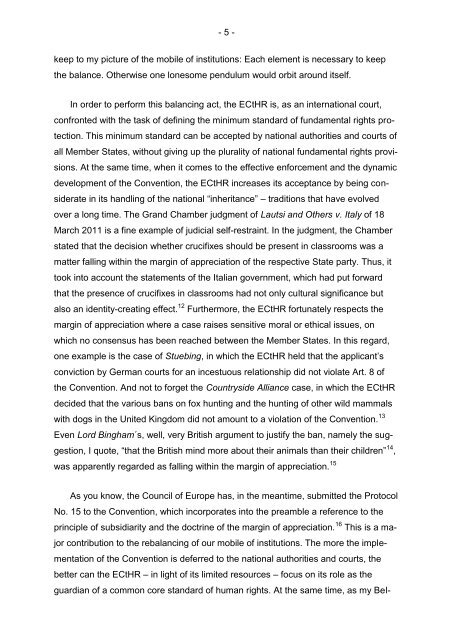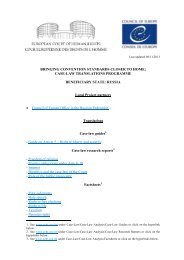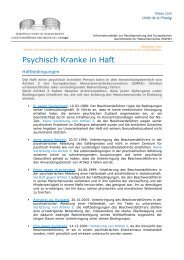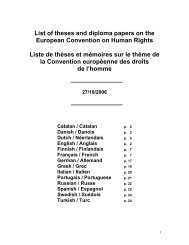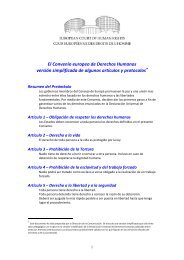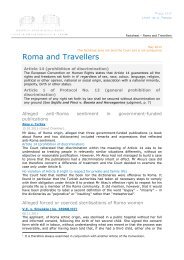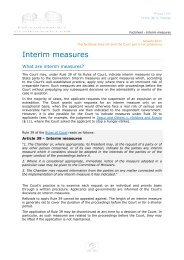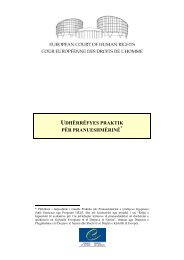Speech by Andreas Voßkuhle - European Court of Human Rights
Speech by Andreas Voßkuhle - European Court of Human Rights
Speech by Andreas Voßkuhle - European Court of Human Rights
You also want an ePaper? Increase the reach of your titles
YUMPU automatically turns print PDFs into web optimized ePapers that Google loves.
- 5 -<br />
keep to my picture <strong>of</strong> the mobile <strong>of</strong> institutions: Each element is necessary to keep<br />
the balance. Otherwise one lonesome pendulum would orbit around itself.<br />
In order to perform this balancing act, the ECtHR is, as an international court,<br />
confronted with the task <strong>of</strong> defining the minimum standard <strong>of</strong> fundamental rights protection.<br />
This minimum standard can be accepted <strong>by</strong> national authorities and courts <strong>of</strong><br />
all Member States, without giving up the plurality <strong>of</strong> national fundamental rights provisions.<br />
At the same time, when it comes to the effective enforcement and the dynamic<br />
development <strong>of</strong> the Convention, the ECtHR increases its acceptance <strong>by</strong> being considerate<br />
in its handling <strong>of</strong> the national “inheritance” – traditions that have evolved<br />
over a long time. The Grand Chamber judgment <strong>of</strong> Lautsi and Others v. Italy <strong>of</strong> 18<br />
March 2011 is a fine example <strong>of</strong> judicial self-restraint. In the judgment, the Chamber<br />
stated that the decision whether crucifixes should be present in classrooms was a<br />
matter falling within the margin <strong>of</strong> appreciation <strong>of</strong> the respective State party. Thus, it<br />
took into account the statements <strong>of</strong> the Italian government, which had put forward<br />
that the presence <strong>of</strong> crucifixes in classrooms had not only cultural significance but<br />
also an identity-creating effect. 12 Furthermore, the ECtHR fortunately respects the<br />
margin <strong>of</strong> appreciation where a case raises sensitive moral or ethical issues, on<br />
which no consensus has been reached between the Member States. In this regard,<br />
one example is the case <strong>of</strong> Stuebing, in which the ECtHR held that the applicant’s<br />
conviction <strong>by</strong> German courts for an incestuous relationship did not violate Art. 8 <strong>of</strong><br />
the Convention. And not to forget the Countryside Alliance case, in which the ECtHR<br />
decided that the various bans on fox hunting and the hunting <strong>of</strong> other wild mammals<br />
with dogs in the United Kingdom did not amount to a violation <strong>of</strong> the Convention. 13<br />
Even Lord Bingham´s, well, very British argument to justify the ban, namely the suggestion,<br />
I quote, “that the British mind more about their animals than their children” 14 ,<br />
was apparently regarded as falling within the margin <strong>of</strong> appreciation. 15<br />
As you know, the Council <strong>of</strong> Europe has, in the meantime, submitted the Protocol<br />
No. 15 to the Convention, which incorporates into the preamble a reference to the<br />
principle <strong>of</strong> subsidiarity and the doctrine <strong>of</strong> the margin <strong>of</strong> appreciation. 16 This is a major<br />
contribution to the rebalancing <strong>of</strong> our mobile <strong>of</strong> institutions. The more the implementation<br />
<strong>of</strong> the Convention is deferred to the national authorities and courts, the<br />
better can the ECtHR – in light <strong>of</strong> its limited resources – focus on its role as the<br />
guardian <strong>of</strong> a common core standard <strong>of</strong> human rights. At the same time, as my Bel-


